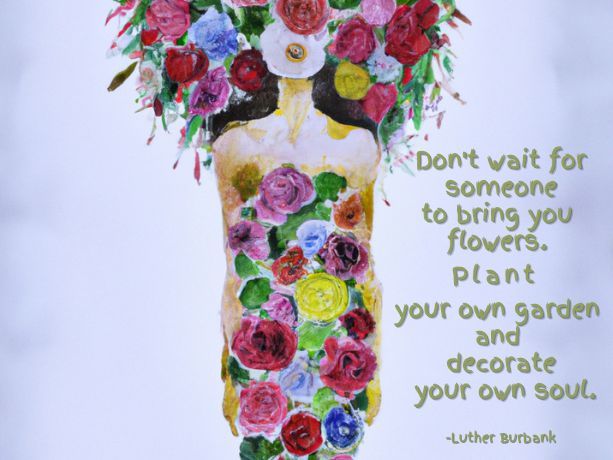At this very moment, red, red roses —the ones you grow course— caught your eye. As you inhale the scent, a sweet serenity washes over you, reminding how valuable those little moments you spend in the garden are.

As mental health awareness increases, so does our realization of how valuable it is to nurture ourselves both mentally and physically. Gardening —enabling us to stay present in the moment with the divine scent of flowers or enchanting our visual experience— is an option worthy of exploration to enhance mental health.
Read on to find out 5 benefits gardening can have on your mental health.
1. Exposure to sunlight enhances mood

Whether we plant, water, and weed in our backyard or tend to a communal garden, gardening can provide a boost to our psychological well-being. Recent studies have revealed that this age-old hobby offers multiple benefits, particularly in regards to mental health.
Getting outside and exposing to sunlight is one of the most powerful weapons against stress and anxiety. Sunlight has been proven to increase our body’s production of vitamin D, which helps to regulate mood and cognitive function, while fresh air lowers stress levels and promotes a sense of relaxation. Collectively it makes for a potent combination capable of having a considerable impact on mental health.
Also, the task-oriented nature of gardening also contributes to its psychological benefits. It frees our mind from ruminating thoughts and actively engages us in an activity that can be both rewarding and comforting. Unlike other forms of exercise, gardening provides a restful sanctuary where we can nurture our plants and contemplate life’s everyday struggles.
Gardening can be a reliable source of therapy that refreshes and reenergizes our minds and bodies. It connects us to the outside world that can help support our overall mental health and well-being. For those looking to enhance their mental health, gardening may just be the key.
2. Increased physical activity improves mental health

Spending time in the garden can bring numerous mental health benefits, according to recent studies. Getting your hands in the soil reduces anxiety and depression while enhancing overall mood due to the release of endorphins - the body's natural feel-good chemical. In addition to its positive effects on mental health, gardening also offers physical activity that can help improve strength and flexibility. This activity engages a person in stretching, lifting, and bending which helps increase strength and flexibility.
Exploring the natural world also invites positive energy into your daily life. Exposure to natural light helps to regulate your sleep cycle which contributes to improved cognitive functioning. Those who take part in gardening enjoy better sleep quality, as well as enhanced mood and overall quality of life. The many physical and mental benefits associated with gardening offer an opportunity to restore balance and gain a greater appreciation of nature in your life.
3. Stress relief supports cognitive functioning

For centuries, it is known that gardening calms the mind, body, and soul. But in recent years, science has revealed more about the calming and cognitive benefits which gardening can provide. Recent studies shows that spending time in the garden reduces stress and improves spirits through increased levels of serotonin and dopamine (two key neurotransmitters associated with well-being). Additionally, the monotonous and mindful nature of gardening tasks like planting and watering shift attention away from negative thoughts and create an atmosphere of relaxation. Gardening also necessitates physical activity that studies have shown to boost memory, attention, and decision-making. The advantages of gardening as a hobby are abundant. From better emotional regulation to reduced depression symptoms and a heightened sense of purpose and satisfaction, gardening can be a joyous endeavour with far-reaching benefits.
4. Watching plants grow gives a sense of accomplishment

Gardening is a wonderful activity that provides people a sense of accomplishment and gives them a purpose. It also offers people an excellent way to foster responsibility and increase motivation, as gardening requires diligence and care. Watching plants grow in response to one's attention and nurturing can create a powerful connection between the gardener and their plants, spurring on their growth and providing visible evidence of their efforts. This feeling of satisfaction has a positive effect on mental health, boosting self-esteem. Engaging in such an engrossing, gratifying experience can deliver sustainable improvements to mental wellbeing over time, making gardening an ideal hobby to focus on for those striving for improved mental health.
5. Feeling of pride increases self-esteem

Gardening is much more than just a hobby - recent research have proved that it helps create and sustain high levels of self-esteem and mental wellbeing. The insights from the study of the University of Westminster have drawn attention to those who engaged in gardening activities reported better mental health, including fewer symptoms of depression and decreased levels of tension. Furthermore, feelings of accomplishment and satisfaction gained from the creative process of growing plants and flowers can give people the confidence they need to maintain a positive attitude. Through gardening, individuals can create something beautiful, meaningful, and all their own; an experience which can give them an immense sense of pride and fulfillment. These findings confirm that gardening can boost one's self-worth, and is beneficial for long-term mental health.
Final Thoughts

Overall, getting your hands dirty in the garden offers a variety of advantages for mental health. From providing a connection with nature to providing a source of physical activity, stress relief and a sense of accomplishment, gardening can be an incredibly fulfilling and therapeutic activity that encourages a positive state of mind. With time, effort and appropriate planning, a hobbyist can craft a garden space that creates a positive ripple effect in all areas of life.